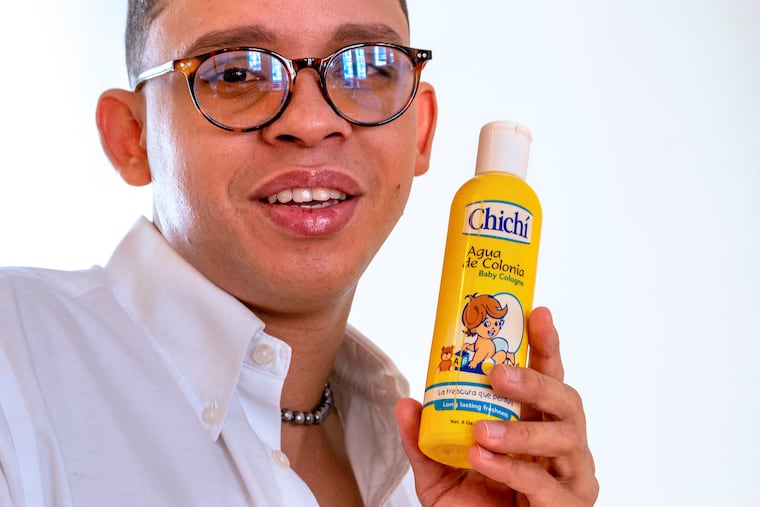Perfume for babies? Better bring your checkbook.
"It's a niche luxury market and status symbol."

Baby perfume is a thing.
Before bundling their little ones in a $530 Burberry Baby hooded fleece, or maybe a $249 White Company cashmere cardigan with footed leggings and bonnet, some parents will spritz their kids with extravagant fragrances.
While it’s the subject of complaints on social media about frivolous excess and potential health endangerment, there’s also growing interest in the little perfume bottles with big prices.
Bulgari advertises Petits Et Mamans, a $76 eau de toilette “dedicated to the relationship between mother and child.” In 2022, Hermès released a $105 alcohol-free fragrance for children aged 3 and older called Cabriole Eau de Senteur, meant to “evoke the scent of a child’s cheek.”
Well-off Philadelphians have demonstrated a limited but enthusiastic desire for baby perfume, although some who’ve immigrated from South and Central American countries, and Cuba, splash their little ones with baby cologne. It’s milder, contains fewer essential oils, and has a shorter-lasting scent than perfumes; it’s also less expensive.
Baby perfume is 1% of the baby toiletries market in the United States. In Latin America, it’s 30% to 40%, Jagadev added.
“My mom used cologne on me when I was a baby in the Dominican Republic,” said Jordano Pena-Sime, 32, a restaurant worker from Queen Village. “I still wear it — Chichí Agua de Colonia [$22.75 at Walmart]. It smells like fruit.
“And it feels good for the memories I have.”
High-end perfumers hope to create that same experience with their products.
“Baby perfume is a niche luxury market,” said Sonali Jagadev, research analyst for Eurocenter, a global market-analysis firm. “It’s a status symbol.” Mothers sometimes use the same fragrances as their babies for scented symmetry. Industry figures show that people who buy baby perfume already spend $500 to $2,500 per year on fragrance and skincare products, said Michael Nordstrand, chief creative officer for Mythologist, a New York-based company that creates perfume for fragrance houses.
Regardless of the label description — eau de toilette, eau de parfum, and eau de senteur — all these products are considered perfume, Nordstrand said.
Google searches for “baby perfume” in the United State have increased 22% over the last year, said Addison Cain, beauty strategy manager at Spate, a trend-tracking company.
There are no available figures showing how much baby perfume is purchased in Philadelphia and its suburbs.
In this area, the brick-and-mortar spot for Hermès Cabriole has been the Hermès shop in King of Prussia mall.
“It’s a beautiful fragrance,” said someone who works there and declined to give their name. “When it was first introduced two years ago, it sold out very quickly.”
The person said Cabriole is not in stock at the store but didn’t make it clear whether more of the bottles with a fanciful drawing of a child and a horse are coming. Hermès executives in New York didn’t respond to requests for information.
‘A traditional thing’
One in five parents expressed interest in baby perfume in a poll taken last year, Nordstrand said. Three in five found it unappealing.
Many parents say they prefer a baby’s natural smell, and science backs them up: Infant odors activate reward and pleasure areas in the brain, and may contribute to parental bonding.
Some pediatric dermatologists say baby perfume can cause irritation and allergies.
Jolene Hart, a Yardley health coach, wellness author, and former national beauty editor for InStyle magazine, said many perfumes contain undisclosed ingredients linked to various health issues, including early puberty in children.
“I love fragrance,” she said. “But I personally stopped wearing it.”
Some fragrance houses try to address health concerns by putting out perfume products described as vegan.
The National Institutes of Health reported in 2022 that some perfumes contain phthalates, known pollutants linked to cardiovascular disease, asthma, and cancer.
Pamela Dalton, a scientist at the Monell Chemical Senses Center in University City, said, “Most commercially available perfume products are safe. But baby skin is sensitive. Lots of babies have reactions to even baby lotions, so you can’t say every perfume is safe.
“If you’re not sure, put the perfume on your baby’s clothes, not their skin.”
Babies can be attracted to their mothers’ perfume and associate it with safety, Dalton said. “So if the mother is using it and the baby is too, it can be comforting to the baby.”
In tropical climates, mothers spray cologne containing alcohol on their babies because alcohol evaporates quickly, cooling the skin, she added.
“In many cultures, the scent of cologne signals to others that you’re taking care of your baby,” Dalton said. “In the U.S., people think well-tended babies should smell like baby powder.”
Aldrick Gessa, founder of the Facebook group Philadelphians of Cuban Metro, said large numbers of Cuban families put agua de violetas (violet water cologne) on their children. He said it’s available only online, in Miami, or Union City, N.J., adding, “My grandma used it on my mom, my mom used it on us, we used it on our children, and our kids use it on theirs.”
Baby cologne is easier to find than baby perfume in the Philadelphia region. Various stores carry it, including Jumbo Meat Market in Northeast Philadelphia, which offers a diverse line of Natura products from Brazil, including baby cologne.
“It’s a big seller, popular with people of Brazilian culture in Philadelphia,” said Jose Silvestri, store manager. “It’s comforting for the mother to smell it.”